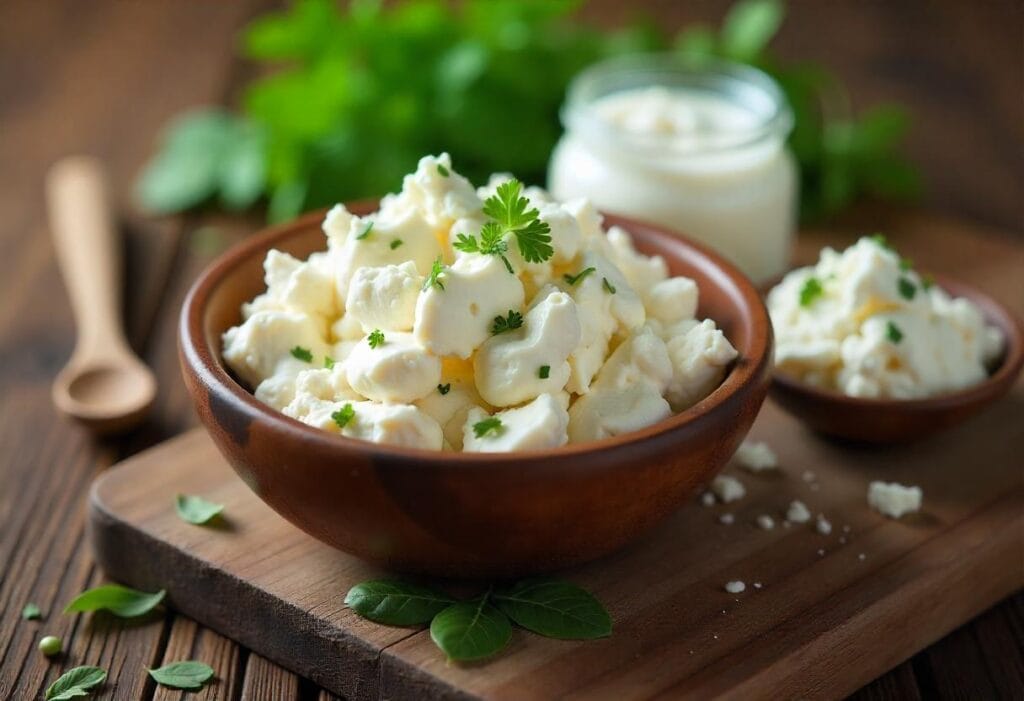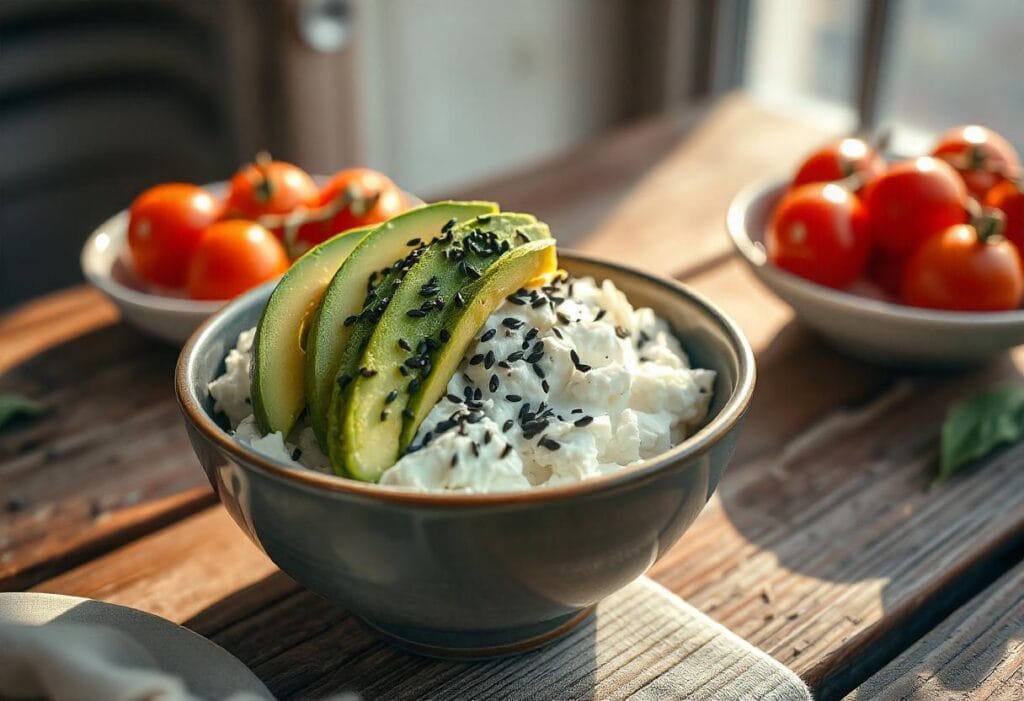Cottage cheese has become a popular food choice for health-conscious individuals. But the question remains: Is cottage cheese actually healthy? This article explores its nutritional benefits, potential concerns, and creative ways to include it in your diet.
The Nutritional Profile of Cottage Cheese
Macronutrients in Cottage Cheese: Protein, Fats, and Carbs
Cottage cheese is celebrated for its well-balanced macronutrient profile. Here’s a breakdown per one cup (approximately 226g) of low-fat cottage cheese:
| Nutrient | Amount | Benefit |
|---|---|---|
| Protein | 28g | Supports muscle repair and keeps you full longer. |
| Fats | 4g | Provides essential fatty acids for energy. |
| Carbohydrates | 6g | Low enough to fit most low-carb diets. |
Protein is undoubtedly the star of the show here. It’s why bodybuilders and athletes frequently include cottage cheese in their diets—it provides a slow-digesting protein called casein, which supports muscle recovery.
Vitamins and Minerals Found in Cottage Cheese
Cottage cheese isn’t just about macronutrients; it also delivers essential vitamins and minerals. Some key players include:
- Calcium: Promotes strong bones and teeth.
- Phosphorus: Aids in energy production and bone health.
- Vitamin B12: Supports brain function and red blood cell production.
- Selenium: Acts as an antioxidant, protecting your cells from damage.
« Think of cottage cheese as a nutrient-packed powerhouse in a humble disguise—it’s small but mighty! »
Comparing Cottage Cheese to Other Dairy Products

How does cottage cheese stack up against other popular dairy options?
- Yogurt: Both are rich in protein, but cottage cheese generally contains less sugar.
- Cheese: Hard cheeses like cheddar are higher in fat and calories, making cottage cheese a lighter option.
- Milk: Cottage cheese offers a more concentrated dose of protein than milk.
Health Benefits of Cottage Cheese
Cottage Cheese for Weight Loss and Satiety
When considering whether cottage cheese is actually healthy, its high protein content stands out. This makes it a favorite among athletes and dieters alike.ous portion without guilt.
💡 Pro Tip: Pair cottage cheese with fruits or veggies for a satisfying, nutrient-dense snack.
Muscle Building and Recovery with Cottage Cheese
For those hitting the gym, cottage cheese is an excellent post-workout food. The casein protein it contains digests slowly, providing a steady release of amino acids to your muscles.
How Cottage Cheese Supports Bone Health
Calcium and phosphorus work hand-in-hand to keep your bones strong, and cottage cheese is a great source of both. Regular consumption can contribute to better bone density, especially as you age.
Potential Concerns with Cottage Cheese Consumption
One concern people often raise when asking, « Is cottage cheese actually healthy? », is its sodium content. While it’s not an issue for everyone, those watching their salt intake should opt for low-sodium varieties.es.
Sodium Content: Is It Too High?
Many store-bought cottage cheese varieties contain significant amounts of sodium. While this enhances flavor, it can be a concern for people watching their salt intake.
💡 Solution: Look for low-sodium versions or rinse your cottage cheese under water to reduce sodium levels.
Lactose Intolerance and Cottage Cheese
Cottage cheese does contain lactose, which can cause digestive discomfort for some people. However, the lactose content is lower compared to milk, and lactose-free options are available.
Additives and Preservatives in Store-Bought Cottage Cheese
Not all cottage cheeses are created equal. Some brands add stabilizers, preservatives, or artificial flavors. Always check the ingredient list to ensure you’re getting a clean product.
« Remember, not all cottage cheese is made with love—read the labels to make the best choice for your health. »
Cottage Cheese and Special Diets
Cottage Cheese in a Keto or Low-Carb Diet
Cottage cheese is a dream food for keto or low-carb enthusiasts. Its low carbohydrate content allows it to fit seamlessly into these diets while providing ample protein and fat.
Is Cottage Cheese Suitable for Vegetarians?
Yes! Cottage cheese is vegetarian-friendly, as it’s made from milk without the use of animal rennet. Pair it with plant-based ingredients to create wholesome vegetarian meals.
Cottage Cheese and Gluten-Free Diets
Good news for those avoiding gluten: cottage cheese is naturally gluten-free. Just make sure to check for cross-contamination or added ingredients in flavored varieties.
Part 2: Choosing the Healthiest Cottage Cheese, Recipes, and Solving Common Problems
Let’s dive deeper into how to select the healthiest cottage cheese, creative ways to incorporate it into your meals, and solutions to common problems that may arise when consuming this popular dairy product.
How to Choose the Healthiest Cottage Cheese
Not all cottage cheeses are created equal, and finding the healthiest option can make a big difference in your diet.
Reading Labels: What to Look for in Cottage Cheese
When shopping for cottage cheese, here’s what to keep an eye on:
- Protein Content: Aim for brands with at least 10-12g of protein per serving.
- Sodium Levels: Look for low-sodium options to keep your salt intake in check.
- Ingredient List: Choose products with minimal ingredients—milk, cream, and cultures are all you really need.
Should You Choose Low-Fat, Full-Fat, or No-Fat Cottage Cheese?
The best option depends on your dietary needs:
- Full-Fat Cottage Cheese: Provides a rich, creamy texture and is ideal for those seeking extra calories.
- Low-Fat Cottage Cheese: A balanced choice for those watching their fat intake but still wanting flavor.
- No-Fat Cottage Cheese: Best for calorie-conscious eaters, though it may lack creaminess.
« Think of choosing cottage cheese like picking the right shoes—it depends on your needs, but quality always matters! »
The Benefits of Organic and Grass-Fed Cottage Cheese
Organic and grass-fed cottage cheese often has a richer taste and better nutrient profile, with higher levels of omega-3 fatty acids and fewer synthetic additives.
How to Include Cottage Cheese in Your Diet
Cottage cheese is incredibly versatile, making it easy to incorporate into every meal.
Healthy Breakfast Ideas with Cottage Cheese

Start your day with these energizing breakfast ideas:
- Cottage Cheese Toast: Spread it on whole-grain toast and top with sliced avocado or berries.
- Smoothie Bowl: Blend cottage cheese with frozen fruits and a splash of almond milk, then top with granola and seeds.
Quick Snacks Featuring Cottage Cheese
For an afternoon pick-me-up:
- Pair cottage cheese with fresh veggies like carrot sticks, cucumber slices, or cherry tomatoes.
- Use it as a dip with whole-grain crackers for a crunchy, satisfying snack.
Dinners and Desserts Using Cottage Cheese

Cottage cheese shines in both savory and sweet dishes:
- Dinners: Add cottage cheese to pasta sauces or use it as a substitute for ricotta in lasagna.
- Desserts: Make a lighter cheesecake by blending cottage cheese with honey and serving it with fresh fruit.
Common Problems and Solutions with Cottage Cheese Consumption
Even with all its benefits, cottage cheese can have some challenges. Here’s how to tackle them:
How to Make Cottage Cheese Taste Better
If the tangy flavor isn’t for you, try these tips:
- Add a drizzle of honey or maple syrup for sweetness.
- Mix in flavorful toppings like roasted red peppers, fresh herbs, or spices.
Preventing Cottage Cheese from Curdling in Recipes
Cottage cheese can curdle if exposed to high heat. Avoid this by:
- Adding it at the end of cooking.
- Blending it to create a smooth texture before mixing it into hot dishes.
How to Avoid Overeating Cottage Cheese
While cottage cheese is healthy, portion control is key. Stick to one serving (about ½ to 1 cup) and pair it with other foods to create a balanced meal.
« Moderation is the secret ingredient to enjoying any food—even cottage cheese! »
The History and Evolution of Cottage Cheese
Did you know that cottage cheese has been enjoyed for centuries? Its history adds an interesting layer to its reputation as a healthy food.
The Origins of Cottage Cheese
The name « cottage cheese » is believed to come from its humble beginnings—made in cottages using leftover milk. This fresh cheese was easy to make and became a staple in many rural households. Over time, its popularity grew, thanks to its simplicity and nutritional benefits.
Cottage Cheese in Modern Diet Trends
Today, cottage cheese has found a place in various diet trends:
- Fitness Diets: High in protein, it’s a favorite among athletes.
- Weight Loss Programs: Its low-calorie count makes it ideal for calorie-conscious eaters.
- Whole-Food Movements: Many appreciate its minimal processing compared to other dairy products.
« Cottage cheese may have started in humble kitchens, but it has earned its place as a superfood in modern diets. »
Myths and Misconceptions About Cottage Cheese
Cottage cheese often gets a mixed reputation due to common myths. Let’s bust a few of them:
Myth 1: Cottage Cheese Is Only for Dieters
While it’s true that many dieters love cottage cheese, its versatility goes far beyond weight loss. It’s a great source of protein for anyone, whether you’re trying to lose weight or fuel up after a workout.
Myth 2: Cottage Cheese Is Bland
This myth couldn’t be further from the truth! Cottage cheese takes on the flavors of whatever you pair it with, making it as exciting as your imagination allows.
Myth 3: Cottage Cheese Isn’t Suitable for Cooking
Many believe cottage cheese can’t hold up in recipes, but it’s incredibly versatile. From lasagnas to smoothies, it blends well into countless dishes.
Cottage Cheese and Gut Health
You may have heard that fermented foods are good for your gut. While cottage cheese isn’t a traditional probiotic food, some varieties contain live and active cultures that promote gut health.
Choosing Probiotic Cottage Cheese
Look for labels that specify live and active cultures. These options can help improve digestion and support a healthy gut microbiome.
Creative and Uncommon Uses for Cottage Cheese
If you’re tired of the usual ways to eat cottage cheese, these unique ideas will inspire you.
Cottage Cheese Pizza Crust
For a high-protein pizza crust, mix cottage cheese with almond flour, eggs, and a pinch of salt. Bake it, then top with your favorite pizza ingredients.
Cottage Cheese Ice Cream
Blend cottage cheese with frozen bananas, a splash of vanilla extract, and a drizzle of honey. Freeze the mixture for a guilt-free, protein-packed ice cream alternative.
Stuffed Mushrooms with Cottage Cheese
Use cottage cheese as a creamy filling for baked mushrooms. Mix it with garlic, herbs, and breadcrumbs for a savory appetizer.
Cottage Cheese in International Cuisines
Expand your culinary horizons by using cottage cheese in global-inspired dishes.
Italian-Inspired Dishes
Replace ricotta with cottage cheese in Italian classics like:
- Lasagna: Cottage cheese adds creaminess without the extra calories.
- Cannoli Filling: Blend cottage cheese with a bit of sugar and vanilla for a lighter dessert filling.
Mexican-Inspired Dishes
Cottage cheese works well in Mexican cuisine as a substitute for sour cream or queso fresco. Try it in:
- Tacos: Add cottage cheese as a topping with salsa and avocado.
- Enchiladas: Mix cottage cheese with shredded chicken for a rich, creamy filling.
How Cottage Cheese Supports Overall Wellness
Cottage cheese isn’t just about physical health—it can also positively impact mental and emotional well-being.
Cottage Cheese and Mood Regulation
Foods high in protein, like cottage cheese, can help stabilize blood sugar levels, which is essential for maintaining a steady mood throughout the day.
Cottage Cheese for Better Sleep
Cottage cheese contains tryptophan, an amino acid that promotes better sleep. Pair it with a small serving of carbohydrates, like fruit or crackers, for a calming bedtime snack.
« Who knew a bowl of cottage cheese could help you sleep better at night? Sweet dreams are made of cheese! »
Eco-Friendly Considerations When Choosing Cottage Cheese
If sustainability matters to you, consider how your cottage cheese is sourced.
Grass-Fed and Organic Options
Organic and grass-fed dairy practices not only produce healthier cottage cheese but also support more eco-friendly farming methods.
Packaging Choices
Look for brands that use recyclable or minimal packaging to reduce your environmental footprint.
Cottage Cheese FAQs: A Few More Answers
Can cottage cheese spoil quickly?
Yes, it can spoil within 5-7 days of opening, so always check for signs of spoilage like a sour smell or discoloration.
Is it okay to freeze cottage cheese?
While freezing is possible, the texture may change. Use thawed cottage cheese in baked or cooked dishes where texture isn’t as noticeable.
How does cottage cheese compare to Greek yogurt?
Both are high in protein, but cottage cheese is lower in sugar, making it a better choice for those watching their sugar intake.
Conclusion: Is Cottage Cheese Actually Healthy?
Cottage cheese checks all the boxes for a healthy food—it’s nutritious, versatile, and accessible. Whether you’re using it to fuel your workouts, improve your gut health, or whip up creative recipes, cottage cheese is a dairy hero.
So, is cottage cheese actually healthy? Absolutely! When consumed in moderation and paired with nutrient-dense foods, it’s a versatile and nutritious option for any meal.ous forms! 🧀✨

